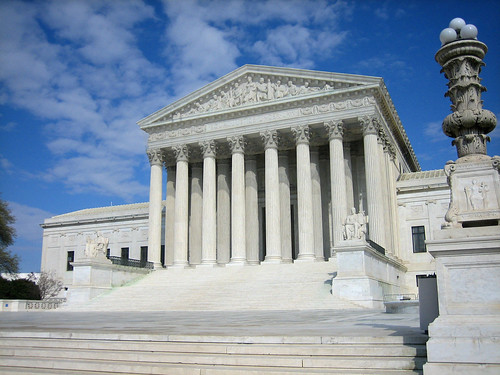
Supreme Court Hears Charities' First Amendment Challenge to Patriot Act
3/9/2010
 On Feb. 23, the U.S. Supreme Court heard arguments in Humanitarian Law Project v. Holder, a case challenging parts of the USA PATRIOT Act (Patriot Act). The Humanitarian Law Project (HLP) and other charities allege that sections of the law violate the First Amendment.
On Feb. 23, the U.S. Supreme Court heard arguments in Humanitarian Law Project v. Holder, a case challenging parts of the USA PATRIOT Act (Patriot Act). The Humanitarian Law Project (HLP) and other charities allege that sections of the law violate the First Amendment.
Under federal law, it is a crime to provide money and weapons to an organization designated as a terrorist group by the United States, but the definition of such "material support" is broad enough to include activities such as providing advice on fostering peace. HLP and others argue that the material support statute is unconstitutionally vague and that American citizens or nonprofit organizations can be convicted of crimes for engaging in lawful activity.
The law barring material support to designated terrorist organizations was first adopted in 1996 and was subsequently strengthened by the Patriot Act. It prohibits providing money and weapons to designated terrorist groups, and it also bans U.S. organizations from providing any "training," "personnel," "service," or "expert advice or assistance," including advice on facilitating peace-building programs. The only exemptions are for medicine and religious materials.
HLP works to mediate international conflicts. Specifically, HLP wanted to provide human rights and conflict resolution training to the Kurdistan Workers' Party (PKK) and the Liberation Tigers of Tamil Eelam (LTTE), both designated terrorist organizations. The Patriot Act's broadening of the definition of material support significantly expanded prospects to prosecute anyone deemed to have provided assistance to a designated organization. Subsequently, HLP stopped working with these groups out of fear it would be considered criminal under the material support statute.
Georgetown University professor David Cole, the attorney representing HLP, argues that the human rights advocates are only interested in supporting lawful activities, urging foreign groups to avoid violence and to take their disputes to the United Nations. Cole's brief states that the material support statute "imposes criminal liability on speech and association without any showing that the speaker intended to incite or promote terrorist activity in any way." He argued that the First Amendment protects those who speak out on behalf of or advise foreign terrorist organizations, as long as they advocate only peace and nonviolence. Cole makes a distinction between aid that is intended to further lawful activity and aid that is intended to further illegal activity.
Meanwhile, during oral argument at the Supreme Court, Solicitor General Elena Kagan stressed that the material support statute is one of the most valuable tools in the fight against international terrorism. Kagan gave examples of prohibited conduct, including helping designated groups by petitioning international bodies or filing a friend-of-the-court brief.
Advocates for change note that the legal regime is broader than Kagan made it sound, allowing prosecutors to target individuals and charities for doing nothing more than providing humanitarian assistance in an area where a designated terrorist organization operates. Ahilan Arulanantham of the American Civil Liberties Union (ACLU) has first-hand knowledge of how the law affects human rights activity. He worked in Sri Lanka after the 2004 tsunami and witnessed humanitarian organizations that could not help victims because they lived in areas controlled by the LTTE.
The ACLU filed an amicus brief on behalf of nine humanitarian groups who teach conflict resolution, provide aid, and engage in various activities that require them to work with designated groups or in areas controlled by such groups. The brief explained that they may be forced to severely limit their nonviolent work because of the material support law.
The Court could either rule to uphold the law or create an exception for peaceful activity. A decision is expected by June or July.
Prior to the oral argument, the Charity and Security Network, along with the Constitution Project, held an informative briefing on the case; the event can be viewed online.
For more on the case, including briefs and information on the issue of material support, visit the Charity and Security Network's website.
Image in teaser by flickr user laura padgett, used under a Creative Commons license


